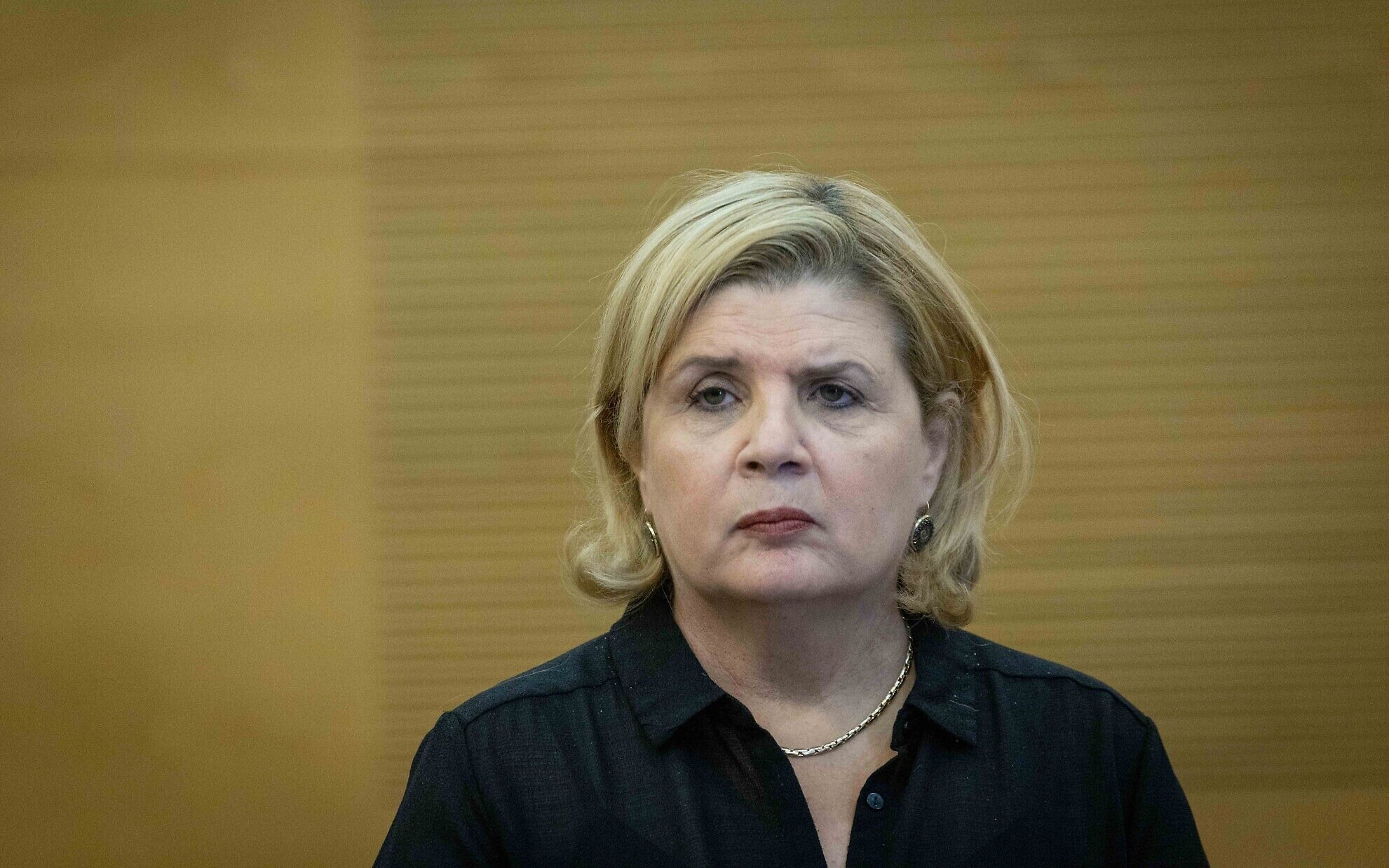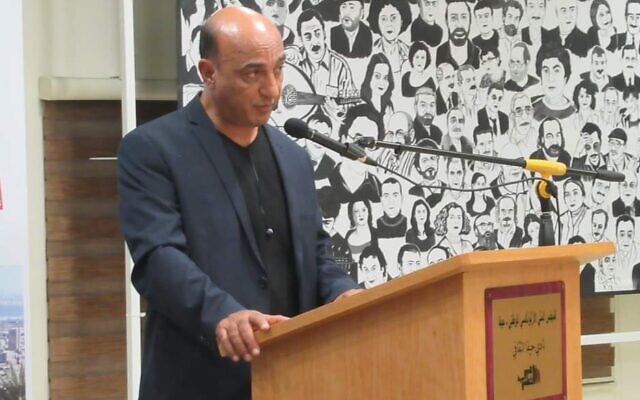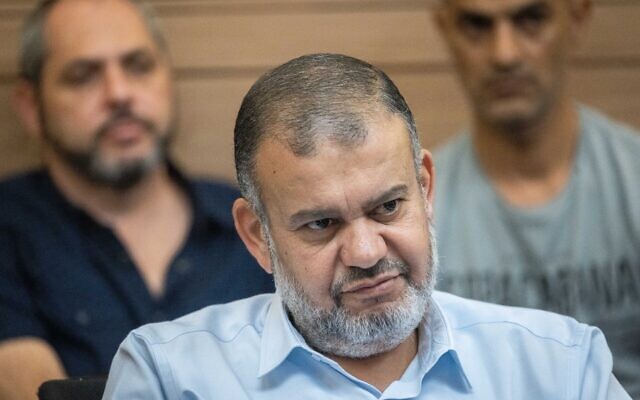
Odeh’s comments imperil prospective cooperation between coalition and Joint List
After the coalition was shoved into a 60-60 stalemate with the opposition by last week’s dramatic departure of MK Idit Silman, it signaled interest in recruiting the majority-Arab Joint List party as a possible lifeline. But inflammatory remarks Sunday by party leader Ayman Odeh may imperil any potential cooperation before it can even begin.
Searching for support from the Joint List was controversial from the get-go, with critics both inside and outside the coalition deriding its leaders’ apparent willingness to work with a party that holds Palestinian national aspirations at its core and, at the extreme, has been accused of being soft on terror.
That criticism was amplified considerably after Odeh visited Jerusalem’s Old City on Sunday evening and lambasted Arab Israeli security forces for participating in the Israeli security apparatus.
“Young people must not join the occupation forces. I call on the young people who have already joined, who are no more than one percent, a total of a few thousand, whose joining is insulting and humiliating, I call on them — throw the weapons in their face and tell them that our place is not with you. We will not be part of the injustice and the crime,” he said.
A spokesperson for Odeh later clarified that the lawmaker’s remarks referred exclusively to those serving in the West Bank and East Jerusalem, as opposed to civilian police.
The comments — made in a Ramadan video from Jerusalem’s Damascus Gate, a flashpoint for violence in recent weeks — called into question the significant movement made in the days following Silman’s defection, which saw both coalition and Joint List leaders shifting their rhetoric to imply there may be some room for cooperation.
While Prime Minister Naftali Bennett’s Yamina party, in its response to Odeh’s comments Sunday night, threaded the needle between reaffirming that the Joint List will not be recruited into the coalition and leaving space for future point-by-point cooperation, Bennett’s close political partner — Interior Minister Ayelet Shaked — was more forceful, accusing Odeh of incitement.
Yamina’s statement read, in part: “Despite rumors, the Joint List will not be part of the coalition or government.”
Shaked, a key Yamina figure who has also been rumored to be a possible defector, tweeted on Monday morning that “Ayman Odeh incites violence against the State of Israel and its institutions. No agreements can be made with him. His place is outside the Israeli Knesset.”

Interior Minister Ayelet Shaked holds a press conference at Ben Gurion Airport near Tel Aviv, March 13, 2022. (Roy Alima/Flash90 )
Although the coalition is a lame duck — unable to pass laws on its own and a seat closer to the threat of disbandment — it is not defeated yet. Coalitions gain power by attaining a majority of at least 61 seats; however, 61 seats are also required to topple them.
The rejection of a coalition role for the Joint List is something of a red herring, as the majority-Arab party was never expected to join the government. The Joint List, an amalgam of three factions, has a longstanding policy of not taking an active role in supporting Israeli governments.
But it is also becoming more attuned to its power. Last week, Odeh hurried to say that the party “will not be a lifeline” to the coalition and that Israel is likely heading to elections. Then on Saturday, he appeared to walk those statements back to a degree, saying that “it’s too early to talk about the dissolution of the Knesset” and affirming that he believes opposition leader Benjamin Netanyahu, who seeks to regain power, is “dangerous” to Arab interests.
Even if it won’t join the ailing coalition, the Joint List can still shore it up in two main ways: First, it can withhold its six votes from any effort to dissolve the Knesset and send Israel back to elections, forcing the opposition bloc to court seven more defectors from the coalition to enact this scenario. Second, but less likely, it can also provide future legislative wins to the hamstrung, no-majority coalition.
Several coalition members have made allusions to these forms of support since last Wednesday’s government shakeup.
In comments made on Sunday before the release of Odeh’s Damascus Gate video, Intelligence Minister Elazar Stern and Economy Minister Orna Barbivai became the latest in a string of coalition members to say they would not dismiss cooperating with the Joint List in order to save the government.
“I am not ruling out anything,” Barbivai told Channel 12 news, in response to a question about whether she would work with the Joint List. “We’re talking to everyone.”

Economy Minister Orna Barbivai at the Knesset in Jerusalem on October 6, 2021. (Yonatan Sindel/Flash90)
A Joint List source told The Times of Israel that the options are open, provided that the coalition is willing to deliver on the party’s requirements.
Past Joint List demands have included supporting a diplomatic process for the creation of an independent Palestinian state and a repeal of the 2018 nation-state law, which defines Israel as the state of the Jewish people. The Joint List has also pushed to reduce the penalties for illegal construction in Arab villages, including ending demolitions of illegal buildings and a repeal of the 2018 Kamenitz law, which increased penalties for unpermitted construction.
However, it is doubtful that the coalition, which includes three right-wing parties, will be able to concede much on those scores.
Ahmad Tibi, the leader of the Ta’al faction in the Joint List, is seen as still weighing his options, having remained conspicuously silent since Silman’s dramatic departure.
Wadi’a Awawdeh, a political analyst for Arabic-language Radio Nas, said that while the Joint List would open itself up to criticism from its Arab voter base if it were to selectively prop up the government, it might find doing so to its advantage, especially as it may currently have an interest in avoiding elections.

Wadi’a Awawdeh, political analyst for Arabic-language Radio Nas. (Courtesy)
“The Joint List is facing a really tough dilemma,” Awawdeh told The Times of Israel. “If it joins the effort to topple the government, the Arab public won’t take it lightly. Because at the end of the day, Netanyahu is still seen as a threat to Arab society.”
Awawdeh noted that Arabs are currently retreating from Israeli politics. He cited a recent poll that showed that only 40 percent of eligible Arab voters in Israel planned to go to the polls in the next election. In the case of yet another election, only a year after the last one in 2021, it could be hard for the Joint List to drive up turnout.
“Tibi also knows that if they just keep saying ‘no’ to the coalition, then the Joint List has to ask itself if they’re ready for elections, because according to [voter turnout] polls, they won’t be good for the Joint List,” he said.
“Tibi thinks that there’s a chance to rack up a few wins, because the government needs help,” Awawdeh said, though he added that the MK was unlikely to provide a blanket promise of support. “He’ll do it as specific horse-trading.”

MK Ahmad Tibi and other members of the Joint List of mainly Arab parties visit the East Jerusalem neighborhood of Sheikh Jarrah on May 10, 2021. (Olivier Fitoussi/Flash90)
But Odeh, largely speaking, has a different approach.
“Ayman thinks this is small politics. There are things to trade, but there are big principles. And this government is bad for Arab civil rights,” Awawdeh said, pointing to the government “destroying homes and passing the Citizenship Law” — an annually renewed measure to block many Palestinians who marry Israelis from receiving permanent residency.
Overall, “the Joint List would be happy if this [Knesset] conflict passes it by, in one way or another, until the timing is better for elections, from their perspective. We’re only a year from the last election, [and] we don’t know what will come next.”
While MK Walid Ta’ha of the coalition’s Ra’am party, which was formerly part of the Joint List, said he would “welcome” Joint List support, he was skeptical that it would come to fruition.

Ra’am MK Walid Taha attends a Knesset Arrangements Committee meeting, on June 21, 2021. (Yonatan Sindel/ Flash90)
“I don’t expect cooperation between the Joint List and the government for the simple reason that the role of the Joint List has always been to break apart every government and dissolve every Knesset,” he told The Times of Israel.
MK Yossi Shain of the coalition’s hawkish Yisrael Beytenu said: “We will find other ways to stabilize the coalition without having to rely on the toxicity of people like Ofer Cassif and Sami Abu Shehadeh,” two Joint List MKs.
His spokesperson reaffirmed that Shain “in no way plans to cooperate with the Joint List,” instead speculating that a path could be found for cooperation with defector Silman on matters where there is ideological alignment.
